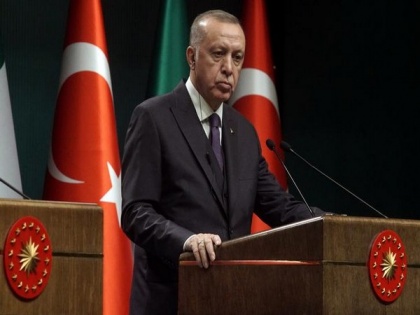Erdogan is moving Turkey towards Russia and China
By ANI | Published: February 1, 2021 12:27 PM2021-02-01T12:27:19+5:302021-02-01T12:35:07+5:30
Facing sanctions from both the EU (European Union) and the US for a series of actions that caused anger and irritation to Ankara's western allies, President Tayyip Erdogan is gradually changing the orientation of Turkey and is moving away from the West and towards Russia and China.

Erdogan is moving Turkey towards Russia and China
Facing sanctions from both the EU (European Union) and the US for a series of actions that caused anger and irritation to Ankara's western allies, President Tayyip Erdogan is gradually changing the orientation of Turkey and is moving away from the West and towards Russia and China.
However, it is believed that, despite the growing geopolitical estrangement between Turkey and the West and the fact that Ankara has concluded a big number of deals with China and Russia, Erdogan does not wish to cut off ties with Washington and Brussels.
Erdogan, after his surprising success in weakening the role of Turkey's military, who for decades had been the arbiter of all political matters in Turkey, moved away from the pro-western Kemalist ideology to an autocratic Neo-Ottoman expansionist nationalism. Following an ambitious but risky foreign policy Erdogan got involved in the conflicts of Syria, Libya and Azerbaijan and revived Turkey's disputes with Greece and Cyprus.
The United States imposed sanctions on Turkey due to the purchase of the Russian S-400 missiles, weapons that the US insists harm the interoperability of NATO's defence system and violate the "sacred rule" of the Alliance, that members should never buy military hardware from a non-NATO state.
Former President Donald Trump had turned a blind eye to a lot of Erdogan's transgressions, but in the end of his term he did not veto the imposition of sanctions on Ankara, something that will undoubtedly hurt Turkey's defence industries.
For his part, Biden had been openly critical of Erdogan and, unlike Trump, is certainly pro-NATO, and so Turkey's military involvement in many parts of the world will not be viewed with apathy from Washington, as was the case in the past.
On the other hand, the European Union is quite dissatisfied with Erdogan's belligerent attitude in the Aegean Sea and the territorial waters of Cyprus, where Turkish ships carry out illegal explorations. The EU is also exasperated with Erdogan's constant threats that he will open the floodgates and let refugees flee to Europe, as well as with his involvement and actions in Libya, Syria, NagornoKarabach and elsewhere. The EU has given Turkey some time to mend its behaviour and threatens to impose much tougher sanctions than those currently applied. German Chancellor Angela Merkel has described Turkey's recent actions as being of "a very aggressive character, or I would say provocative character."
Being left with very few friends and facing mounting internal problems- the impact of coronavirus on Turkey's important sector of tourism, the devaluation of the Lira by almost 40% last year, the shrinking money reserves and the disappearance of foreign investors, Erdogan turned his attention to Russia and China.
Russia has been one of the most important trade partners of Turkey. Trade volume between the two states has reached 26,309 billion USD in 2019, with Turkey's 3,854 billion USD worth of exports and 22,454 billion USD imports. One of the most important elements in relations between the two countries is energy. Russia is building the Akkuyu Nuclear Power Plant near the Mediterranean coast, while the TurkStream Natural Gas Pipeline has been inaugurated in January 2020.
China, for its part, decided to take advantage of the opportunities created as a result of the economic problems facing the Turkish economy, partly due to Erdogan's mishandling of the economy. Beijing threw a lifeline to the autocratic Islamic leader, becoming Turkey's second import partner after Russia. It provided loans amounting to about 4.6 billion, helping him avoid getting loans from the International Monetary Fund, and made investments in Turkey amounting to 3 billion.
As AycaAlemdaroglu and Sultan Tepe wrote in the Foreign Policy magazine,"China's Belt and Road Initiative (BRI) offers Turkey a source of fresh cash-and Beijing a strategic foothold on the Mediterranean Sea. As part of the infrastructure-building initiative, Turkey completed a railroad from Kars in eastern Turkey via Tbilisi, Georgia, to Baku, Azerbaijan, on the Caspian Sea, from where it links to transportation networks to China. In 2015, a Chinese consortium bought 65 percent of Turkey's third-largest container terminal, Kumport, in Istanbul, acquiring a pivotal position in container transportation. Chinese investors also helped salvage Erdogan's own poorly managed megaprojects. In January 2020, a Chinese consortium bought 51 percent of the Yavuz Sultan Selim Bridge connecting Europe and Asia across the Bosporus, after revenue projections failed and the Italian-Turkish consortium controlling the bridge wanted out."
On January 29 Turkey sent off two export trains, one headed to Russia and the other to China, using the Baku-Tbilisi-Kars (BTK) railway from the capital Ankara. The train to Russia is the first block train to use the route while the second one, which is carrying boron (a mineral used in chemical compounds)containers, is the third China-bound freight train.
The question that needs to be answered is whether the Biden Administration will impose stricter sanctions on Turkey, something that may push Ankara into the arms of Russia or will try to win it back for the Western alliance.
As Timothy Ash,senior markets strategist at Bluebay Asset Management, says "Turkey is mega strategic" for the U.S. and Europe and so "winning' Turkey back from Russia would be a huge win for Biden, and I think they will focus on that."
( With inputs from ANI )
Disclaimer: This post has been auto-published from an agency feed without any modifications to the text and has not been reviewed by an editor
Open in app